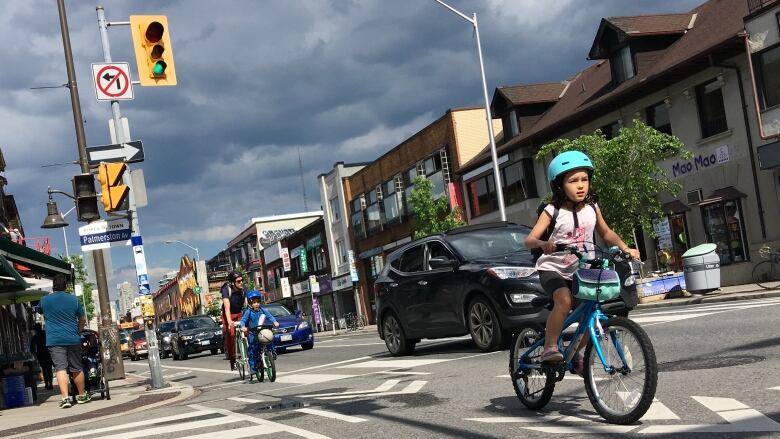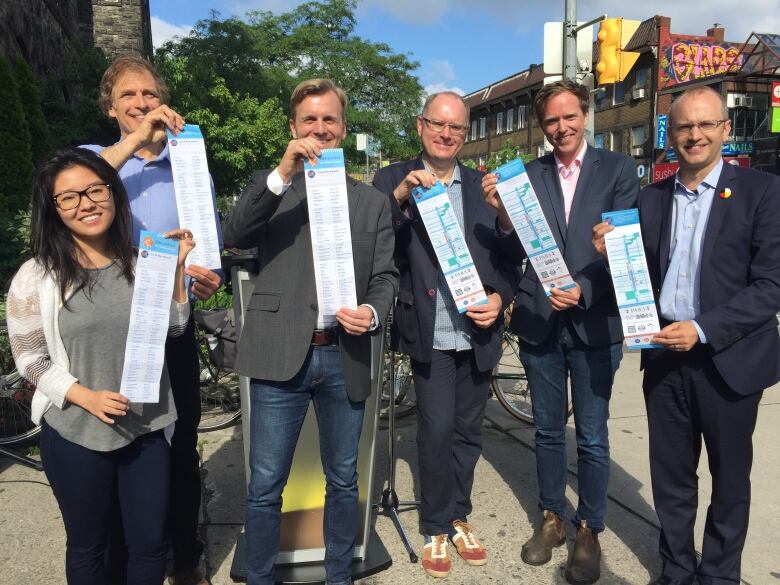Millennials want to keep their beloved Bloor bike lanes boomers, not so much
Poll finds 7 in 10 Torontonians surveyed support lanes, highest support from 18 to 34-year-olds

A new poll shows support fortheBloorStreet bicycle lanes has gone up and it's millennialsleading the push.
More than 80 per cent of 18 to 34-year-olds polled want to make the lanes permanent, compared to just 55 per cent of those aged 55 and older, according to the survey of more than 800 Toronto residents conducted by Angus Reid in June.
Set for release on Monday, the poll alsofound roughly 70 per cent of all those surveyedwant to keep the bike lanes that were first launched as a pilot project back in August 2016. That's a big jump from a previous poll last fallthat found 56 per cent of the city approved of the lanes,notesJaredKolb, executive director of cyclist advocacy group Cycle Toronto.
- Toronto cyclists calling forBloorStreet bike lane pilot project to be made permanent
- Bloorbike lanes boost cyclist traffic by 36%, increase drive times, says city
"That should send a fairly strong message to our elected officials, to the mayor, that a significant majority of Torontonians are behind making these lanes permanent," says Kolb.
The survey, commissioned by the David Suzuki Foundation (a Cycle Toronto partner), follows a city report earlier this year which found the bike lanes boosted cycling traffic by 36 per centbut led to longer travel times for drivers.
"Whether you're a cyclist or a driver, there seems to be a real consensus now that we should put road safety over speed," saidGideonForman, a transportation policy analyst with the foundation.
Toronto divided on bike lane business impact
But what's dividing Toronto residents is the impact of the bike lanes on businesses. The new survey found 43 per cent of those polled think bike lanes generallyhave a positive effect on local businesseswhile 30 per cent think it's a negative impact.
One Annex convenience store owner told CBC Toronto the bike lanes have led to a drop in business equal tohundreds of dollars a day.
"It's really an inconvenience for the business ... I hope they get rid of the bike lanes," says Soo Yoo, whose store is near the intersection of Bloor and Bathurst streets.
Encouraging cyclists to stay and shop in the area is part of the reason for a new "passport" program involving around 70 Bloor Street businesses, spearheadedby local residents' associations and Cycle Toronto.
Business concerns aside, many say the benefits of the BloorStreet bike lanes outweigh any downsides.
Ward 20 Coun. Joe Cressystresses how early data shows the number of cyclists are up and safety in the area is improved, with only a marginal impact on car travel times.

The latest survey, he adds, "bodes well" for the continuation of the Bloorbike lanes leading into city council's fall vote on the project.
"Residents in every corner of this city whether it's Scarborough or Etobicoke or downtown support the Bloor bike lane," he says.
"And I think that indicates a shift in our city where people are realizing our streets are increasingly dangerous as our population continues to grow."
The survey also found nearly all respondents 97 per centsupport the city's Vision Zero road safety plan, which has a goal of eliminating all deaths and serious injuries from traffic collisions.
Around 80 per cent of people polled also say they support lower speed limits on city streets.












_(720p).jpg)


 OFFICIAL HD MUSIC VIDEO.jpg)
.jpg)



























































































